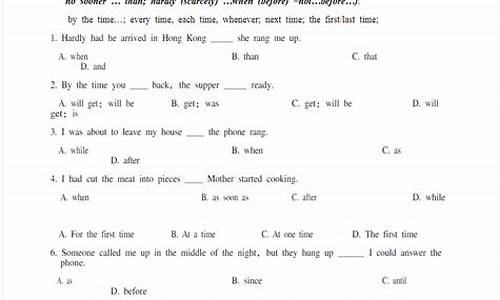您现在的位置是: 首页 > 招生信息 招生信息
状语从句高考真题_状语从句高考真题及答案
tamoadmin 2024-06-03 人已围观
简介1.一道高考的英语题谢谢~~2.精选高考英语语法填空真题(10篇)3.广东10年高考英语第40题4.以下为高考真题,before与until在高考选择题中如何选择?5.一道选择题,请解释一下理由Thank you for all your hard work last week.I don‘t think we___it without考点名称:状语从句状语从句的概念:状语从句指句子用作状语时,起
1.一道高考的英语题谢谢~~
2.精选高考英语语法填空真题(10篇)
3.广东10年高考英语第40题
4.以下为高考真题,before与until在高考选择题中如何选择?
5.一道选择题,请解释一下理由Thank you for all your hard work last week.I don't think we___it without

考点名称:状语从句
状语从句的概念:
状语从句指句子用作状语时,起副词作用的句子。它可以修饰谓语、非谓语动词、定语、状语或整个句子。根据其作用可分为时间、地点、原因、条件、目
的、结果、让步、方式和比较等从句。状语从句一般由连词(从属连词)引导,也可以由词组引起。从句位于句首或句中时通常用逗号与主句隔开,位于句尾时可以
不用逗号隔开。
比较while/as/when:
1、as/when引导短暂性动作的动词例句:
如:Just as/Just when/When I stopped my car, a man came up to me.
2、当从句的动作发生于主句动作之前,只能用when引导这个从句,不可用as或while。
如:When you have finished your work, you may have a rest.
3、从句表示“随时间推移”连词能用as,不用when或while。
如:As the day went on, the weather got worse.
比较untill/till:
两个连词意义相同,肯定形式表示的意思是“做某事直至某时”,动词必须是延续性的。否定形式表达的意思是“直至某时才做某事”,动词为延续性或非延续性都可以。
正确使用这两个连词的关键之一就在于判断句中的动词该用肯定式还是否定式。
肯定句例句:I slept until midnight. 我一直睡到半夜时醒了。
Wait till I call you. 等着我叫你。
注意:在肯定句中可用before代替:Let's get in the wheat before the sunsets.
否定句例句:She didn't arrive until 6o'clock.
I didn't manage to do it until you had explained how.
1、Until可用于句首,而till通常不用于句首。
例句:Until you told me, I had heard nothing of what happened.
2、Untilwhen疑问句中,until要放在句首。
例句:Until when are you staying? 你呆到什么时候?
注意:否定句可用另外两种句式表示。
1)Not until…在句首,主句用倒装。
例句:Not until the early years of the19th century did man know what heat is.
2)It is not until…that…
状语从句的用种类:
1、时间状语从句:
表示时间的状语从句可由when, as, while, whenever, after, before,
till(until), since, once, as soon as(或the moment), by the time, no
sooner…than, hardly(scarcely)… when, everytime等引导。
e.g. When I came into the office, the teachers were having a meeting.
He started as soon as he received the news.
Once you see him, you will never forget him.
No sooner had I gone to bed than I went to sleep.
2、原因状语从句:
原
因状语从句是表示原因或理由的,引导这类从句的最常用的连词是because, since, as,
nowthat(既然)等,for表示因果关系时(它引导的不是从句)为并列连词,语气不如because强。 e.g. He is
disappointed because he didn't get the position.
As it is raining, I will not go out.
Now that you mention it, I do remember.
3、地点状语从句:
引导地点状语从句的连词是where和wherever等。
e.g. Sit wherever you like.
Make a mark where you have a question.
4、目的状语从句:
引导目的状语从句最常用的词(组)是so, so that(从句谓语常有情态动词), in order that, in case(以防,以免)等。
e.g. Speak clearly, so that they may understand you.
She has bought the book in order that she could follow the TV lessons.
He left early in case he should miss the train.
5、结果状语从句:
结果状语从句是表示事态结果的从句,通常主句是原因,从句是结果。由so that(从句谓语一般没有情态动词),so…that, such…that等引导。
e.g. She was ill, so that she didn't attend the meeting.
He was so excited that he could not say a word.
She is such a good teacher that everyone admires her.
6、条件状语从句:
条件状语从句分真实性(有可能实现的事情)与非真实性(条件与事实相反或者在说话者看来不大可能实现的事情)条件句。
引导条件状语从句的词(组)主要有if, unless, so(as)long as, on condition that, so(as) far as, if only(=if)。
注意:条件从句中的if不能用whether替换。
e.g. If he is not in the office, he must be out for lunch.
You may borrow the book so long as you keep it clean.
So far as I know(据我所知), he will be away for three months.
You can go swimming on condition that(=if) you don't go too far away from the river bank.
If he had come a few minutes earlier, he could have seen her.
7、让步状语从句:
让步状语从句可由although, though, as, even if(though), however, whatever, whether…or, no matter who(when, what,…)等引导。
注意:as引导的让步状语从句一般是倒装的。
e.g. Though he is a child, he knows a lot.
Child a she is, he knows a lot.
Whatever(=No matter what) you say, I'll never change my mind.
8、方式状语从句:
方式状语从句常由as, as if(though), the way, rather than等引导。
e.g.You must do the exercise as I show you.
He acted as if nothing had happened.
9、比较状语从句:
比较状语从句常用than, so(as)…as, the more…the more等引导。
e.g. I have made a lot more mistakes than you have.
He smokes cigarettes as expensive as he can afford.
The busier he is, the happier he feels.
使用状语从句时要注意的几个问题:
1、在时间和条件(有时也在方式、让步等)从句中,主句是一般将来时,从句通常用一般现在时表示将来。
e.g. We'll go outing if it doesn't rain tomorrow.
I'll write to you as soon as I get to Shanghai.
2、有些时间、地点、条件、方式或让步从句,如果从句的主语与主句主语一致(或虽不一致,是it),从句的谓语又包含动词be,就可省略从句中的“主语+be”部分。
e.g. When(hewas) still a boy of ten, he had to work day and night.
If(you are) asked you may come in.
If(it is) necessary I'll explain to you again.
3、注意区分不同从句:引导的是什么从句,不仅要根据连词,还要根据句子结构和句意来判别。以where为例,能引导多种从句。
e.g. You are to find it where you left it.(地点状语从句)
Tell me the address where he lives.(定语从句,句中有先行词)
I don't know where he came from.(宾语从句)
Where he has gone is not known yet.(主语从句)
This place is where they once hid.(表语从句)
注意:表示“一…就…”的结构 hardly/scarcely…when/before/no sooner…than和as soon as都可以表示“一…就…”的意思。
例句:I had hardly/scarcely got home when it began to rain.
I had no sooner got home than it began to rain.
As soon as I got home, it began to rain.
注意:如果hardly/scarcely或nosooner置于句首,句子必须用倒装结构:
例句:Hardly/Scarcely had I got home when it began to rain.
No sooner had I got home than it began to rain.
一道高考的英语题谢谢~~
《高中英语语法-英语陷阱题4例之三》由留学liuxue86.com我整理。本内容整理时间为05月12日,如有任何问题请联系我们。
英语陷阱题4例之三
析:if和whether都可以表示?是否?,但if不能用于引导主语从句、表语从句和同位语从句,这时只能用whether。
11.误:The Anti-Japanese War was broken out in 1937.
正:The Anti-Japanese War broke out in 1937.
析:只有及物动词或作及物动词的动词短语才能变为被动语态。而arrive,become,die,lie,end,happen,take place等作不及物动词,均不可变为被动语态。
12.误:I will do all I can help you.
正:I will do all I can to help you.
析:do all one can+to do sth(尽某人所能去做某事)中的one can是定语从句修饰all,从句中省略了动词do,to do sth是不定式作目的状语。
1.?Tomorrow ____ my birthday. I?d like you and Jane to come.
? I?m not sure if she ____ free.
A. will be;is B. is going to;is
C. is;is D. is;will be
错解 选C,认为应该用一般现在时表示一般将来时。
分析 这里涉及一个概念问题。状语从句中,常用一般现在时表示一般将来时,如:If it rains tomorrow, I won?t go to the park. 但这并不适用于其他从句。比如宾语从句:I wonder when he will come here. 主语从句:That he will come is certain. 同位语从句:He expressed the wish that he would like to come again the next year.等等,上述从句都可以用将来时。本句中,if引导的是宾语从句,是可以用一般将来时的。正确答案为 D。
2.? Why does Linda know so much about Eiffel Tower?
? She ____ have been there,or...
A. must B. could C. can D. should
错解 选B,因为后面有or,表示?或者?,表明语气的不确定性。
分析 这里有个最关键的单词or,它如果是表示?或者?,则该句子没有理由省略后面的内容,这时,就要考虑到or还有另外一层含义?否则?,相当于:She must have been there, or she can?t know so much about it.她一定去过那儿,否则(她不可能了解得那么清楚)。省去上句问题中的重复部分。正确答案应为A。
3.? Have a good Women?s Day, mom.
?Thanks. What a nice girl? _______.
A. You?re welcome B. That?s all right
C. It?s kind of you to say so D. The same to you
错解 选C,认为她女儿还年轻,不能称之为woman,因此不能过Women?s Day? 所以选C而不选D。
分析 该题考查的是交际用语。A项和B项是针对对方说Thank you 或Thanks的答语。 C项与上文What a nice girl重复。D项 The same to you (也祝你节日快乐)比较恰当,而上句中的girl,不一定非译成?女孩?,可以理解成?女儿?,相当于daughter。正确答案为D。
4.? Hey, look where you?re going?
?Oh, ____.
A. I am not noticing B. that?s all right
C. I don?t mean to do it D. I?m terribly sorry
错解 选A,与上句时态一致。
分析 该题若选A,应表示短暂的过去进行概念,应为I was not noticing; B表示?不用谢?;C项语气不好,不礼貌,时态也不对,应改成:I?m sorry, I didn?t mean to do it.正确答案为D。
1.误:My brother,that you met in Bejing? has bought a new car.
正:My brother,whom you met in Bejing? has bought a new car.
析:非限定性定语从句不能用that引导。当先行词指物时,用which;当先行词指人,并在从句中作主语时,用who;在从句中作宾语时,用whom。
2.误:All what he said is true. 《高中英语语法-英语陷阱题4例之三》由留学liuxue86.com我整理
精选高考英语语法填空真题(10篇)
选B。
The children went home from the grammar school,their lessons finished for the day
孩子们从语法学校回来,并且完成了作业。
解析:首先,完成作业,作业应该是动作的承受者,应该是被完成,所以排除A、C。其次,如选D项,their lessons前应加连词and,因为两个简单句之间必须用连词来连接,所以D项不对。此处考察的是独立主格结构,它由两部分组成,前一部份是名词或者代词,后一部分是非谓语动词(不定式、动名词和分词)或形容词、副词、或介词短语。前后两部分具有逻辑主谓关系。独立主格结构在句中做状语,多用于书面语。 独立主格结构本身不是句子,在句子中作状语,表示时间、原因、条件、伴随、目的等,这里是作伴随状语,故选B。
望采纳,祝开心~!
广东10年高考英语第40题
语法是语言的骨架,为了帮助考生们熟练掌握语法,下面我为大家搜索整理了关于 高考 英语语法填空真题(10篇),欢迎参考练习,希望对大家备考有所帮助!想了解更多相关信息请持续关注我们应届毕业生培训网!
Passage 1 (2015?新课标全国Ⅰ)
阅读下面材料,在空白处填入适当的内容(1个单词)或括号内单词的正确形式。
Yangshuo,China
It was raining lightly when I __1__ (arrive) in Yangshuo just before dawn.But I didn't care.A few hours __2__,I'd been at home in Hong Kong,with __3__ (it) choking smog.Here,the air was clean and fresh,even with the rain.
I'd skipped nearby Guilin,a dream place for tourists seeking the limestone mountain tops and dark waters of the Li River __4__ are pictured by artists in so many Chinese __5__ (painting).Instead,I'd headed straight for Yangshuo.For those who fly to Guilin,it's only an hour away __6__ car and offers all the scenery of the better-known city.
Yangshuo __7__ (be) really beautiful.A study of travelers __8__ (conduct) by the website TripAdvisor names Yangshuo as one of the top 10 destinations in the world.And the town is fast becoming a popular weekend destination for people in Asia.Abercrombie & Kent,a travel company in Hong Kong,says it __9__ (regular) arranges quick getaways here for people __10__ (live) in Shanghai and Hong Kong.
语篇导读
桂林山水甲天下,阳朔风光甲桂林。作者讲述了从香港去阳朔旅游时的所见。
1.解析:考查动词的时态。主句谓语动词使用了过去进行时,根据语境此处要用一般过去时态。
答案 arrived
2.解析:考查副词的用法。由语境可知,几个小时之前我还在香港的家中,由此可知before/earlier符合句意。
答案 before/earlier
3.解析:考查形容词性物主代词的用法。空格后面有名词smog,故要使用形容词性物主代词。
答案 its
4.解析:考查定语从句关系代词的用法。由句子结构不难判断这是一个定语从句。先行词为指物的mountain tops and dark waters,关系词在从句中作主语,因此答案为that/ which。
答案 that/ which
5.解析:考查名词的复数。?so many+复数名词?为一常用短语。
答案 paintings
6.解析:考查介词的固定用法。根据句意可知,这只是驱车一小时的路程。?by+交通工具名词?为一固定短语。
答案 by
7.解析:考查主谓一致和动词时态。本段介绍阳朔的自然条件,属客观事实,要用一般现在时,由于主语是单数第三人称形式,因此答案为is。
答案 is
8.解析:考查过去分词短语作后置定语的用法。study与conduct之间为动宾关系,故用表示被动的过去分词形式。此外,by是解题的关键词,conducted by...意为?由?所做的?。
答案 conducted
9.解析:考查副词的用法。该词修饰谓语动词arrange,故要用其副词形式。
答案 regularly
10.解析:考查现在分词短语作后置定语的用法。由于live与其所修饰的名词people之间为逻辑上的主谓关系,故用表示主动意义的现在分词形式。
答案 living
Passage 2 (2015?新课标全国Ⅱ)
阅读下面材料,在空白处填入适当的内容(1个单词)或括号内单词的正确形式。
The adobe dwellings(土坯房)__1__(build) by the Pueblo Indians of the American Southwest are admired by even __2__ most modern of architects and engineers.In addition to their simple beauty,what makes the adobe dwellings admirable is their __3__(able) to ?air condition?a house without __4__(use)electric equipment.Walls made of adobe take in the heat from the sun on hot days and give out that heat __5__(slow)during cool nights,thus warming the house.When a new day breaks,the walls have given up their heat and are now cold enough __6__ (cool) the house during the hot day:__7__ the same time,they warm up again for the night.This cycle __8__ (go) day after day: The walls warm up during the day and cool off during the night and are thus always a timely offset(抵消)for the outside temperatures.As__9__(nature) architects,the Pueblo Indians figured out exactly__10__thick the adobe walls needed to be to make the cycle work on most days.
语篇导读
相比现代化的建筑,简陋的土坯房可谓丑陋不堪。但当代的 建筑师 却对其情有独钟。短文主要介绍了土坯房能够调节温度的原理。
1.解析:考查过去分词短语作后置定语。主语dwellings与动词build之间为逻辑上的动宾关系,故用过去分词形式。又由by一词的暗示也可知用表示被动意义的过去分词。
答案 built
2.解析:考查定冠词的用法。空格之后为形容词的最高级形式,故填定冠词。
答案 the
3.解析:考查形容词与名词的转换。形容词性物主代词their之后应当用名词,故将able转化为其名词形式。
答案 ability
4.解析:考查介词的用法。介词without之后的动词要用动名词形式。
答案 using
5.解析:考查副词的用法。由土坯制成的墙壁在炎热的白天吸收太阳的热量并在凉爽的夜间慢慢将热量释放出来。修饰谓语动词give out,因此要用副词形式。
答案 slowly
6.解析:考查固定句式的用法。?形容词+enough+动词不定式?为一常用句式。
答案 to cool
7.解析:考查固定短语的用法。at the same time意为?同时?,是一个常用介词短语。
答案 at
8.解析:考查动词的时态。这是一篇说明文,主要介绍了土坯房冬暖夏凉的原理,故用一般现在时态。
答案 goes
9.解析:考查形容词的用法。修饰名词architects,故要用形容词形式。
答案 natural
10.解析:考查宾语从句的连接词用法。分析句子结构可知,这是一个宾语从句。根据形容词thick及结构可知这里的意思是印第安人要算出土坯墙的确切厚度。所以答案为how。
答案 how
Passage 3 (2015?福建)
阅读下面短文,根据以下提示:1)汉语提示,2)首字母提示,3)语境提示,在每个空格内填入一个适当的英语单词,所填单词要求意义准确,拼写正确。
Sometimes we have disagreements with people.When this (1)h_____, the important thing is to try not to let a calm discussion turn into a heated argument.Here (2)_____ my tips for you.
The (3)f_____ thing I would say is that the way you begin the conversation is very important.
Imagine you are a student and you share a flat (4)_____ another student who you think isn't doing her share of the housework.If you say, ?Look, you never do your share of the housework.(5) _____ are you going to do about it?, the discussion will very soon turn into an argument.It's much more (6)_____ (有帮助)to say something like, ?I think we had (7)b_____ have another look about how we divide up the housework.Maybe there is a better way of dealing with it.?
My second piece of (8)a_____ is simple.If you're the person who is in the wrong, just admit it! This is the easiest and best way to avoid an argument.Just make an (9)_____ (道歉), and move on.The other person will have more respect for you (10)_____ the future if you do that.
答案:
1.happens 2.are 3.first 4.with 5.What 6.helpful/beneficial 7.better 8.advice 9.apology 10.in
Passage 4 (2015?湖南)
Directions: Complete the following passage by filling in each blank with one word that best fits the context.
Research has become both simpler and more complex. It's simpler because, __1__ you have a computer, you can find information you need by searching the Internet. For all your information, you don't have to go to __2__ library to find the relevant resource and take notes on it. Instead, you can find some sources from the Internet __3__ print the copies needed.Remember, however, that you should usually consult different types of sources. That is, you __4__ always rely just on the Internet for your research.
While finding information is easier than ever, at the same time, researching has become __5__ complex. There is a lot more material available, which means you may be overwhelmed __6__ the amount of information. You need to learn __7__ to sort through and find the relevant information for your particular project. Also, __8__need to check the accuracy of it.
语篇导读
随着电脑和因特网的出现,研究变得既简单又复杂。一方面,我们不必像以往一样在书中搜索资料,这为我们提供了极大的方便;另一方面,网络中众多的资料良莠不齐,选择准确的信息使我们的工作变得愈加复杂。
1.解析:考查状语从句。根据句意,如果你有了电脑,你可以通过上网获得所需的信息。
答案 if
2.解析:考查冠词。go to the library去图书馆;in the library 在图书馆。
答案 the
3.解析:考查连词。and 连接并列谓语find和print。
答案 and
4.解析:考查情态动词。根据上文你应该(should)查阅不同的资料。
答案 shouldn't
5.解析:考查形容词比较级。参见上文第一句more complex。
答案 more
6.解析:考查介词。be overwhelmed with 面临,陷入。
答案 with
7.解析:考查疑问词。根据句意,你需要学习如何分类并找到特定任务的相关信息。how to do 是含有疑问词的不定式,在此处作宾语。
答案 how
8.解析:考查代词。参见上文You need to learn how to sort throug...
答案 you
以下为高考真题,before与until在高考选择题中如何选择?
答案是:that
分析:用同位语从句,用that引导从句做this lesson的同位语
主要是考察从句的连词选择。你的语法还是比较薄弱,没有搞清概念。建议你看一下语法书,搞清,定语、状语、同位语的用法。不要把同位语和定语的概念混淆了。
注意:不能填which(定语从句才能用)
我能帮的就是这么多了,看你领悟多少了
一道选择题,请解释一下理由Thank you for all your hard work last week.I don't think we___it without
until 意思是“直到”,not… until是“直到…才”;before"在…之前”。两者都适用的情况下,前者语气更强,试比较:I won't leave here before my father come back. I won't leave here until my father come back. 前者是:在我爸爸回来前,我不会离开这儿. 后者是:我是不会离开这儿的,直到我爸爸回来。后者语气更坚定。
这里的第一句用before较好,意思是:拉里,在我想好之前,我给不了你答案。 如果用until,翻译为:我是给不了你答案的,直到我想好了。 前者的回答是比较符合日常对话方式的,而后者中文翻译起来虽然也通,但没有前者自然,而且英语中通常不这么用;
第二句也是用before较好,你应该在上床睡觉前用温水泡泡脚,而不是“你应该用温水泡脚直到你上床睡觉” 体会一下
一道选择题,请解释一下理由Thank you for all your hard work last week.I don't think we___it without 检举 | 离问题结束还有 14 天 23 小时 提问者:匿名 | 浏览次数:8次
Thank you for all your hard work last week.I don't think we___it without you.A、can manageB、could have managedC、could manageD、can have managed这是今年山东高考题第24题,答案选B,求解释
答:第一句及这个without是关键。
第一句话中的last week说明是上周的事,你们很努力工作了,在此我们表示感谢。
这个without就是一个含蓄的虚拟条件句=without your hard work= if it had not been your hard work, 是对过去情况的一种虚拟假设。实际情况是,你们worked hard last week 了,而我们是managed it 了。
所以主句用could not have managed it , 由于用了否定前移,所以成为:I don't think we could have managed it without.
译:谢谢你,上周辛苦了。要不是们这么拼命干的话,我想我们不可能完成这件事的。
你好象漏打了一个you:
(2008山东卷)24. Thank you for all your hard work last week. I don’t think we ______ it without you。
A. can manage B. could have managed
C. could manage D. can have managed









